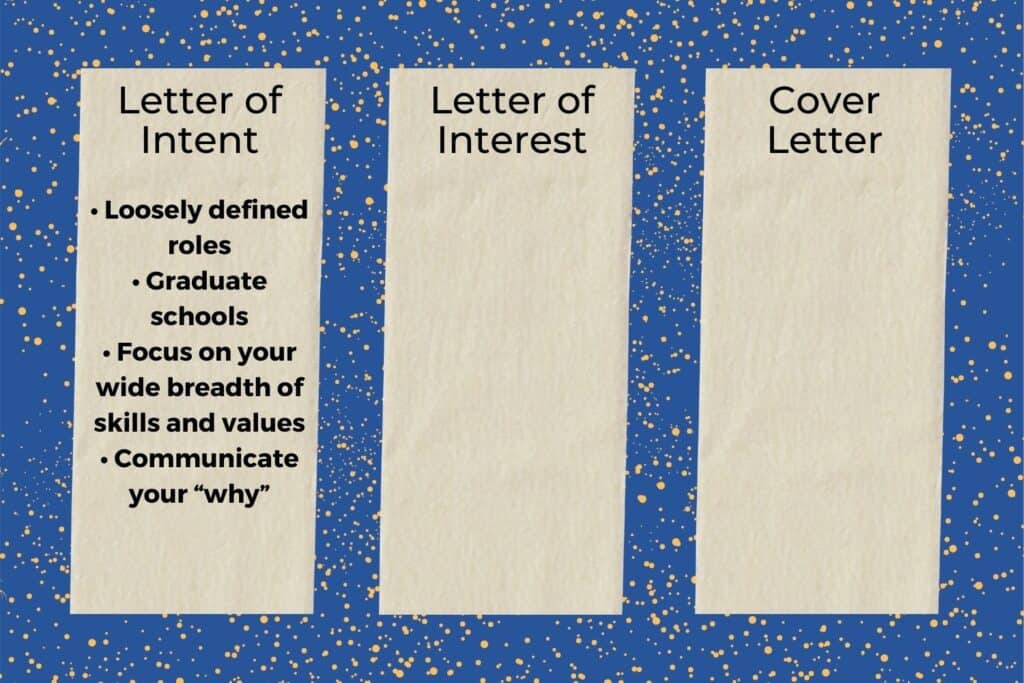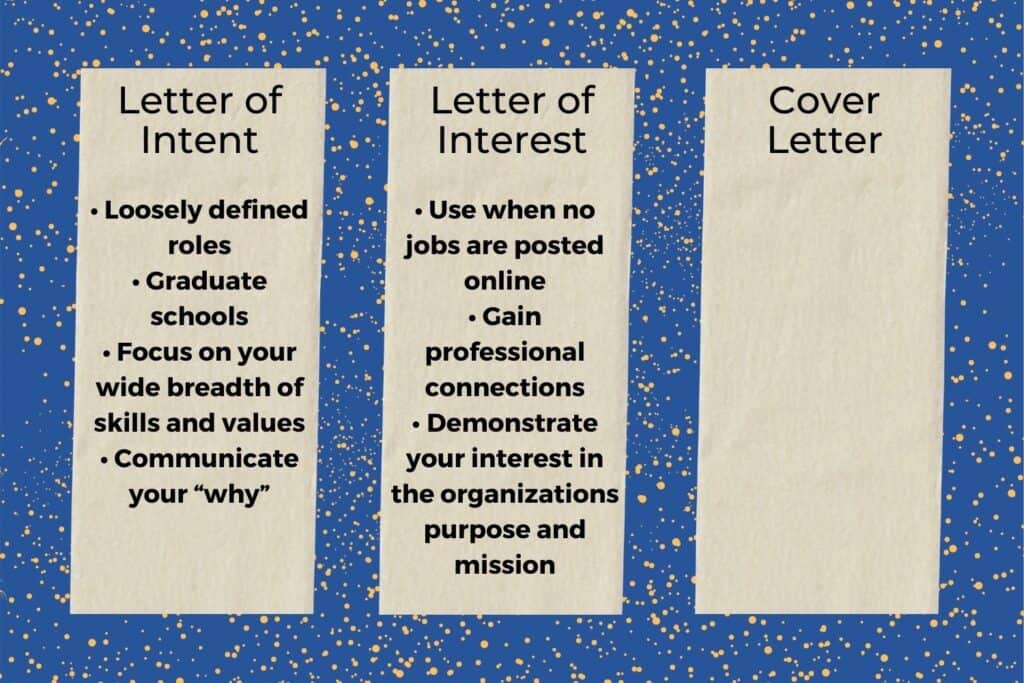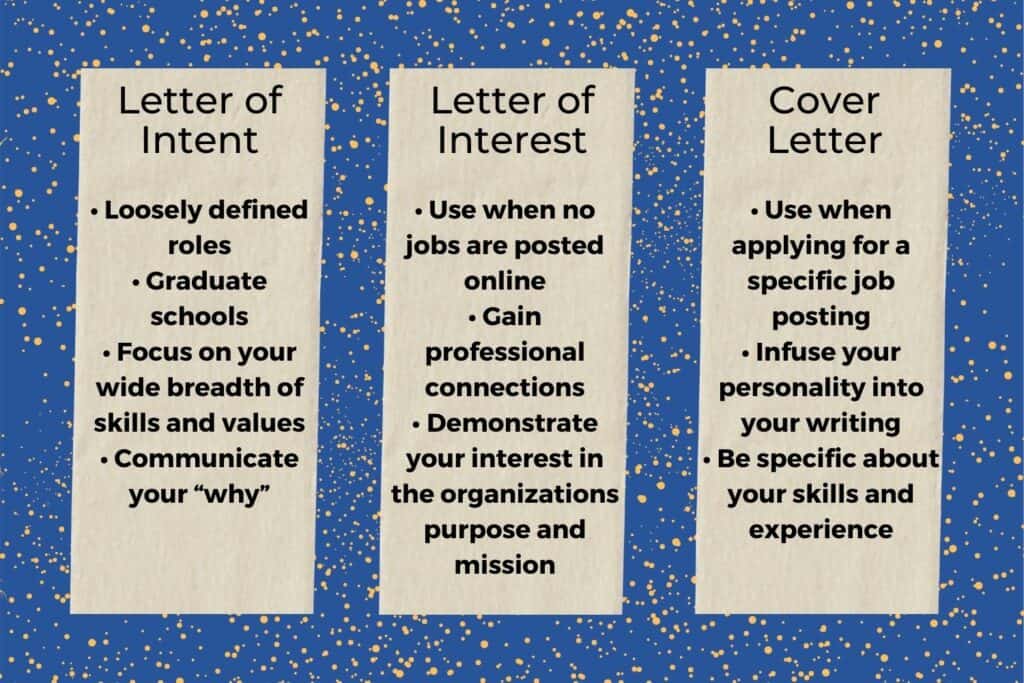
Is it time for you to write a job application letter?
If so, you’re probably looking at job postings and wondering what in the heck you’re supposed to include. And while you think you are a good fit for the role, you need to figure out how to convince a reader with a very short attention span!
If you are like most, you may feel some confusion caused by the different requests of every organization on their postings. Some want a letter of intent, some want a letter of interest, and some want a cover letter. It’s downright confusing!
If you’re not sure about the difference between each style of letter, and want to wow your potential employer. Read on!
Use a Letter of Intent for Graduate Schools and Loosely Defined Roles

A letter of intent is often requested when applying to graduate school positions or at start-up organizations. Why startups? Well, many new companies with net-new positions do not have a well-defined set of responsibilities and skills for the role. The job title and job posting may be vague and designed as a catch-all for many applicants.
In these newly created roles, hiring managers look to the successful candidate to help to form the role based on your skills. This means that instead of writing a cover letter (where you can match a formalized job description with your abilities and skillsets) you need to tell the hiring manager about all the different ways you could bring value to their growing organization.
To do that, letters of intent are fantastic tools. Intent letters help you to tell your story and demonstrate your value without the confines of the job requirements. If you’re looking to get a job in an organization where you can have a wide variety of responsibilities and can participate in different parts of the company, applying to start-ups is a great way to do it. A letter of intent will help you share the breadth of value you can bring to the team by showing a wide array of loosely relevant skills. Start-ups care much more about the fact that you match with the organization’s purpose than with the exact skillset of the job.
You will also need to write a letter of intent if you’re applying to a professional school or a graduate degree program. This includes research programs, medical school, law school, and many post-graduate programs. In your letter of intent, you need to describe exactly what your purpose is rather than what your skills are. Moreover, describe why this is the perfect program for you at your dream school.
Specific skills don’t matter all that much when applying to graduate school. You are not attending because you have skills… you are there to learn the skills. A letter of intent communicates the why behind the steps that you want to take in your career or your studies.
When you’re pursuing a new opportunity, a letter of intent can allow you to introduce yourself at the level of your values. Where a cover letter focuses on your skills, a letter of interest touches on your skills and dives deeper into your career mission.
When you’re writing a letter of intent focus on the “why”
Introduce yourself from the perspective of your purpose. And allow the company to understand how your values and visions will match with their mission statement. The same can be said describing the perfect match between your values and visions and that of a post-secondary program.
Not applying for a specific job? Use a letter of interest

If a cover letter is an application to a specific job, and an intent letter is part of the application process for a graduate school or a start-up with loosely defined requirements, a letter of interest is when there is no specific role at an organization… but you want to work there anyway! Your goal is to express interest in the organization as a whole.
Instead of applying to an available job opportunity, you’re trying to proactively build a network or connection with a particular company. A letter of interest can be an email or an introductory message. You can send it as a physical letter if you like to be a little old-school and set yourself apart from all the people reaching out on LinkedIn. Ultimately, all networking emails can be considered a letter of interest.
In a letter of interest the organization might not be hiring or at all interested in looking at candidates or applications. But just because you don’t see an open position, does not mean there is no opportunity! Instead of applying for a job, introduce yourself. Explain the reason why you think you should get to know a company or individual who works for that company.
This is very similar to a LinkedIn message or connection request like this:
“Hello, I would love to meet you and think we would have a very interesting discussion. I’m very interested in your company and would love to hear more about your organization. Let me know when you would be free.”
Your letter of interest does the same thing but in a lot more detail. Here’s what to cover in a letter of interest:
- how you came across the company
- why you’re interested in the organization
- what questions you have about the company, their purpose or their product or their service
Use your letter to express your interest in the organization. A letter of interest without genuine interest is just a letter. And let me tell you… everyone is getting hundreds of emails a day and they do not need another one.
A well-crafted letter of interest takes just as much forethought, planning and research as a letter of intent or a cover letter. But this one is not to get you a job, it’s to get you a connection. Your professional network is a powerful tool to progress your career. Letters of interest build the beginning of a relationship. And then when an appropriate position comes along you are more likely to be the one they reach out to about the role.
They also might create a position for you because they learn about your skills, strong interest in the company, and they see the value that you can bring to their team. They can decide that you will be a great fit, and create a position for you! This is how a lot of hiring happens!
The common opinion is that most people just apply to jobs… but in so many cases organizations will create opportunities for individuals based on their interest, their values and the skills that they can bring to the table. People choose to work with the people they like and the people they know. By sending a letter of interest you are creating an opportunity for yourself that did not exist before.
When sending a letter of interest email, request to set up a virtual meeting with the company or individual. This will improve the traction that you gain in building the new relationship.
If you set up a meeting, treat it as an informational interview. This is a great opportunity for you to gain as much information as possible about the organization. If you are interested in learning more about the informational interview, check out this article.
Write a cover letter when applying for a specific job posting

Most organizations request a cover letter over any other introduction format. A cover letter is a targeted introduction of yourself to the company. In it, you can explain why you should work in a specific position. Cover letters are powerful tools to tell your story, highlight your relevant work experience, share what value you can add to the organization, and what value the organization can add to you.
In a cover letter, your goal is to introduce yourself, discuss the available position and how you came across it, and talk about the qualifications that you have for the role. It’s important to avoid competing or duplicating your resume in the process. Add extra insight into who you are and why you care about the position. Discuss how the values of the company or the purpose align with your long-term vision for your career.
Writing letters can be the hardest part of your job application
Cover letters, letters of intent, and letters of interest are some of the most challenging and stressful things to prepare during your job search. When we start to write our initial letter to a future employer we want to make an incredible first and impression.
And it’s hard to create a letter that will represent us well when many of us don’t enjoy writing (and feel that we are bad at it). And even worse, is that the letter will be used to give someone their first impression of us! UGH! We rely on a letter to help put our best foot forward and get us to the next stage of the interview process.
It’s a lot to do in one letter… and one thing to consider is that in the age of COVID-19 and remote work we are often not applying for jobs in person. If you’re applying by email you do not need to attach a separate letter to indicate your interest! You can include that in the email body of the text.
In fact, cover letters are more likely to be read if you do include them in the body of the email message. In about 30% of cases, we see that cover letters are both required and read by employers. In another 30%, they are asked for only to check if you were reading the requirements for the role (but is not read). And in the last 30%, they are neither required nor read. In this scenario, it is best to just include a friendly and thorough email when you are applying to a position.
If you’re applying through an online portal you may not need to include anything at all.
No matter what type of letter you are writing, include these details:
- up to date phone number
- the job opening you are interested
- relevant contact information (email is preferred)
Any introductory letter presents the opportunity to build a relationship with the hiring manager before you ever meet them.
The only battle is picking the right style of the letter and using that letter to effectively introduce yourself to a new individual.
In any type of letter that you write, think about these main things:
- Introduce the hiring manager to your personality — in the first paragraph tell them more than your years of experience. They can read that in your resume. Introduce them to you as a holistic human.
- Tell them what you will get out of a position at the company — how is the role beneficial to you? Is it financially important, helpful to devlop new skills, expose you to a new industry, offer a flexible work schedule? Whatever it is, tell the reader about it!
- Tell them what the company will get out of you — highlight how you are different from all the other job seekers out there. What will they get from, you if hired, that they will get from no-one else? What makes you the perfect fit?
But how do you know whether the employer wants a letter?
You don’t!
But there are a few tricks to figure it out.
- What does the posting ask for? Read the details carefully and if in doubt write a thorough letter of intent in the body of an email.
- Does the posting include specific questions? In a lot of postings, they will say “are you a person who is creative and inspired to design high-performing products?” If they ask a question, then it’s a good idea to address their question in a cover letter
- Is there room to upload only one document? If so, they are likely to only review a resume that has been submitted. Don’t waste your time with an extensive cover letter or letter of intent.
Not writing a letter goes against a lot of the advice you’ve received.
If you are like me, you have relied upon your cover letter too heavily when applying to open positions. Since many of us you have only learned how to write a standard cover letter, it can be easy to think that a letter of interest and a letter of intent is the same.
But I work as a recruiter, and I am here to tell you I have read many bad cover letters. So many that I stopped reading most of them! I will take a 5-second glance to assess if a cover letter will be different from the crowd and skip it if it seems generic. If it sounds like everyone else’s letter, it’s not going to be read. I know that cover letters are often very generic. If they sound like everyone else’s, they add very little value to the interview process.
